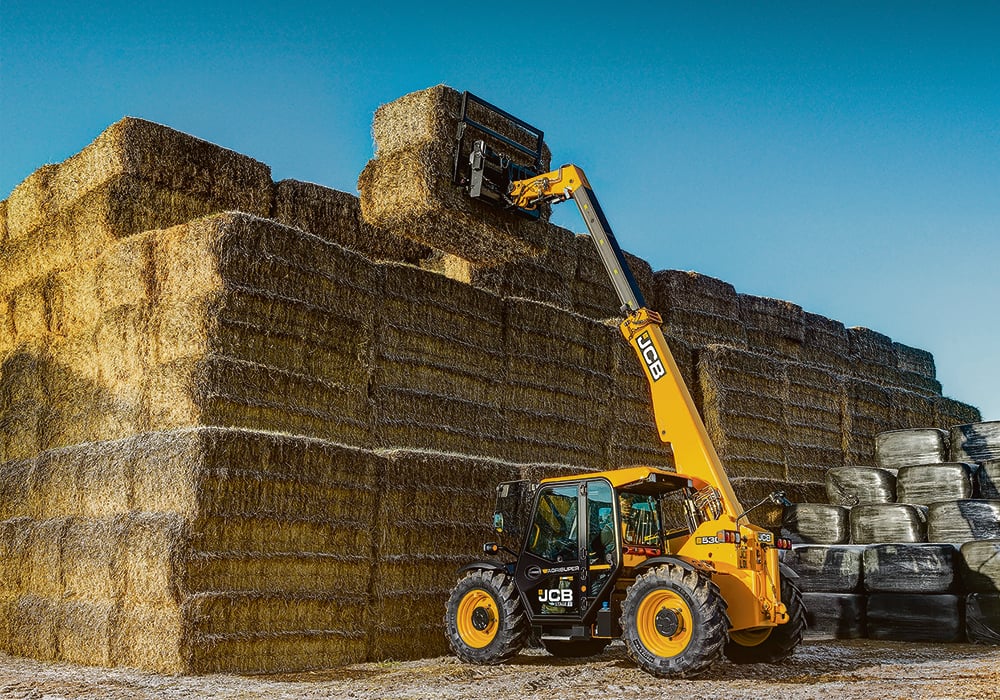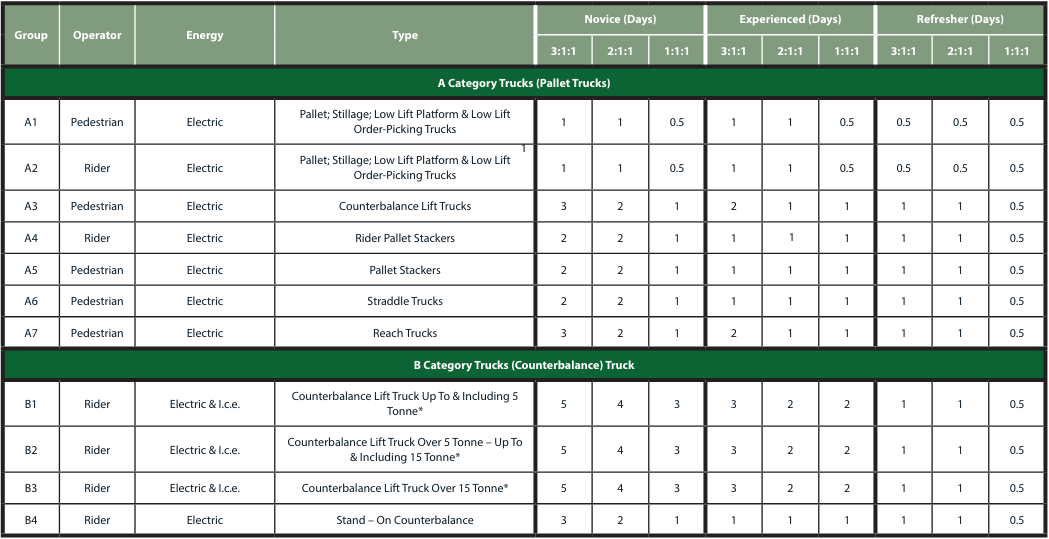Rough Terrain (Telehandler) trucks provide a more versatile alternative to the traditional masted counterbalance truck, offering both forward and vertical reach with greater distances. A key feature that sets telehandlers apart from other types of lifting equipment is the ability to reach high and far distances because of the extendable boom. They can also be fitted with various attachments such as forks, buckets, and cranes, giving even more functionality and usefulness in a variety of industries.

B Category Truck Course Durations

For more information on minimum AITT course durations then please visit:
https://aitt.co.uk/assets/Uploads/AF020-AITT-Course-Durations-Summary-2020-V8.2.pdf
Novice Course
Before an operator can operate a counterbalance forklift truck they will need to have completed comprehensive training. This course is typically completed over three – five days and includes both theory and practical training. No previous experience operating materials handling equipment is required. Davies MHE Training LTD follows the guidelines suggested by L117 ACOP published by the HSE. During the training course, delegates will be required to complete three basic elements of testing; a theory, pre-use inspection and practical skills test. If delegates are successful in completing all of three tests, they will be issued a certificate of basic training from Davies MHE Training LTD.
Novice Course Timings
3 x delegates = 5 days
2 x delegates = 4 days
1 x delegate = 3 days
Experienced Course
This course is for existing operators with some previous experience of using a counterbalance forklift truck and is aimed at people who have had previous operating experience, but either do not have a certificate or are unable to provide proof that they held one. The course complies with the standards set in accordance with L117.
Experienced Course Timings
3 x delegates = 3 days
2 x delegates = 2 days
1 x delegate = 2 days
Refresher Course
This forklift refresher course is available for those operators with documentary evidence of formal training and who wish to renew their certification to use counterbalance forklift truck and will include theory instruction and assessment followed by practical operator training and assessment which will comply with the standard laid down in accordance with the HSE code of practice L117.
Regular refresher training will ensure operators:
-
- maintain good driving habits
- learn new skills where appropriate
- reassess their abilities
Refresher training or retesting might also be appropriate where operators:
-
- have not used trucks for some time
- are occasional users
- appear to have developed unsafe working practices
- have had an accident or near miss
- have changed their working practices or environment
Refresher Course Timings
2 x delegates = 1 day
1 x delegate = 0.5 day
How often do I need to provide refresher training?
There is no specific time period after which you need to provide refresher training or formal assessment. However, you may decide that automatic refresher training or a retest after a set period (for example 3-5 years) is the best way to make sure employees remain competent. Where you adopt this approach, you will still need to monitor performance, in case operators need extra training before the set period ends.
Use of trucks by non-employees
Use of lift trucks by people other than employees is increasingly common. Typically this is done by visiting lorry drivers and service engineers. Employers and site controllers should cooperate to ensure that only adequately trained people operate lift trucks. Operator competence can be demonstrated via an appropriate training certificate and operators should be familiar with the specific risks of the machine and site (eg. Machine stability, load type/size, site layout and surface including slopes, etc). The degree of familiarity of site/machine risks should reflect what operators are asked to do and how it is to be done, as well as where the tasks will be carried out.
Rough Terrain (Telehandler) trucks provide a more versatile alternative to the traditional masted counterbalance truck, offering both forward and vertical reach with greater lift heights. A key feature that sets telehandlers arepart from other types of lifting equipment is the ability to reach high and far distances because of their extendable booms. With the ability for increased reach, telehandlers can easily lift heavy loads to elevated heights making them a popular choice for stacking materials, loading and unloading trucks, and erecting structures. They can also be fitted with various attachments such as forks, buckets, and cranes, giving even more functionality and usefulness in a variety of industries.